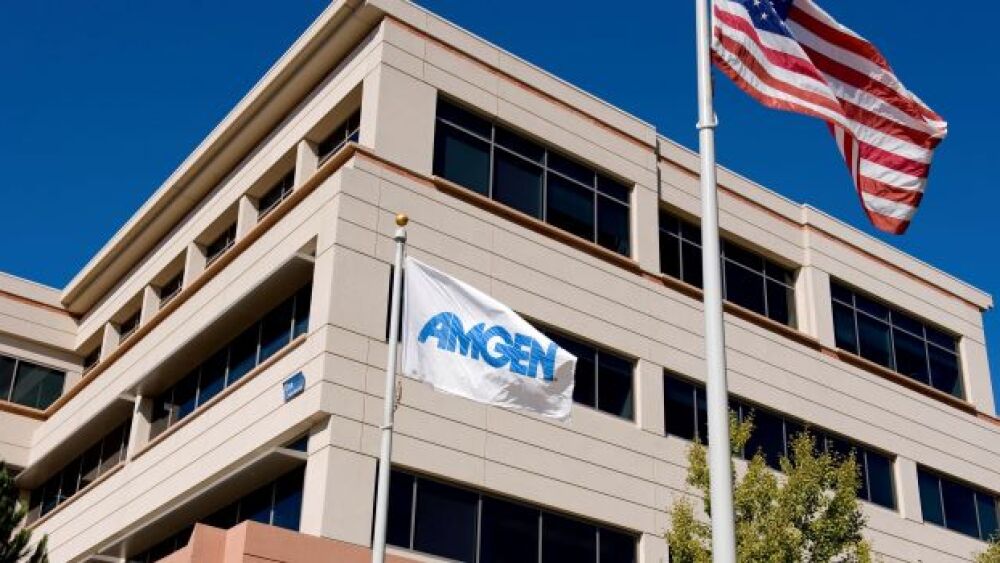The U.S. FDA granted Amgen Priority Review for sotorasib for patients with KRAS G12C-mutated locally advanced or metastatic non-small cell lung cancer (NSCLC), after at least one previous systemic therapy.
Photo courtesy of Amgen.
The U.S. Food and Drug Administration (FDA) granted Amgen Priority Review for sotorasib for patients with KRAS G12C-mutated locally advanced or metastatic non-small cell lung cancer (NSCLC), after at least one previous systemic therapy. Two weeks ago, the drug received Breakthrough Therapy Designation by the Center for Drug Evaluation in China for the same indication.
On January 29, Amgen reported data from the Phase II cohort of the CodeBreaK 100 trial of sotorasib in 126 patients with KRAS G12C-mutated advanced NSCLC. The drug demonstrated a confirmed objective response rate (ORR) of 37.1% and a disease control rate (DCR) of 80.6% and a median duration of response of 10 months. It was also the first KRASG12C inhibitor to demonstrate progression-free survival (PFS), with a median of 6.8 months in a Phase II trial.
The Priority Review designation knocks four months off the standard review cycle. The FDA grants the designation for drugs that offer significant improvements over available options. It will have a Prescription Drug User Fee Action (PDUFA) data, i.e., target action date, of August 16, 2021.
Sotorasib is a KRASG12C inhibitor. It is the first such drug to enter the clinic and is being evaluated in 10 combinations in trials on five continents with more than 700 patients with 13 different tumor types.
NSCLC makes up 80% to 85% of all lung cancers. Most patients, about 66%, have advanced or metastatic disease at initial diagnosis. KRAS G12C is a mutation that is most common in NSCLC and there is a significant unmet need and poor outcomes associated with the second-line treatments of KRAS G12C driven NSCLC. In the United States, about 25,000 new patients are diagnosed with KRAS G12C-mutated NSCLC annually.
“Patients with advanced non-small-cell lung cancer who have failed first-line treatment face extremely poor outcomes with limited treatment options available to them, and Amgen has been committed to changing that,” said David M. Reese, executive vice president of Research and Development at Amgen. “Targeting KRAS has been a 40-year quest by scientists and researchers around the world, and we are extremely pleased that sotorasib has successfully demonstrated rapid, deep and durable responses in this registrational Phase II study that was conducted in record time. We are proud that sotorasib may potentially become the first approved targeted therapy for these patients.”
After the release of the Phase II data, Michael Yee, a Jefferies analyst, wrote in a note to clients, “This was expected to be positive already so this is just confirmation the data is good and is already under review by the FDA, and as the prior top-line disclosure by the company stated the efficacy is ‘consistent’ with Phase I results.”
Of the patients in the trial, 80% achieved disease control. There were three complete responses and 43 partial responses, with a 60% median best tumor shrinkage among all responders. It was 1.4 months to median time to objective response.
The benefit-risk profile with most treatment-related adverse events (TRAE) were favorable, with mild-to-moderate grade 1 or 2 and no treatment-related deaths. Grade 3 treatment-related adverse events were reported in 25 patients and one patient reported a Grade 4 TRAE.
The most common TRAEs of any grade were diarrhea, nausea, increased alanine aminotransferase and increased aspartate aminotransferase. TRAEs only caused treatment discontinuation in 7.1% of patients.
At this point, there are no KRAS inhibitors approved.
Featured Jobs on BioSpace





